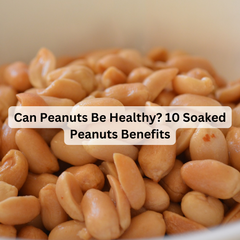When it comes to snacking healthily, many of us face the same confusion: Organic vs. Regular Dry Fruits - which one should I put in my cart? Dry fruits like almonds, cashews, raisins, and walnuts are already considered superfoods, but today’s market offers two clear categories: organic dry fruits vs non-organic dry fruits.
Parents, fitness enthusiasts, and working professionals often wonder: Are organic dried fruits better than regular ones? Do they really make a difference, or is it just a marketing label? Let’s break it down step by step so you can confidently choose the best option for your health and lifestyle.
Organic vs Regular Dry Fruits: Understanding the Difference
The real difference between organic and regular dry fruits lies in how they’re grown, processed, and preserved.
-
Organic Dry Fruits are cultivated without synthetic pesticides, fertilizers, or preservatives. Farmers rely on natural compost, crop rotation, and eco-friendly practices. These fruits are then dried without artificial chemicals, keeping their nutrition intact.
-
Regular Dry Fruits (non-organic) are grown using chemical fertilizers and pesticides. To extend shelf life, many undergo chemical fumigation or preservative coating.
In short:
-
Organic = purity, natural taste, chemical-free nutrition.
-
Regular = mass production, longer shelf life, but possible chemical residues.
Benefits of Organic Dry Fruits
One reason people prefer organic is the clear benefits of organic dry fruits over regular ones. Let’s explore:
-
Free from Chemical Residues
Unlike non-organic dry fruits that may contain pesticide traces, organic ones ensure you snack without hidden chemicals.
-
Better Nutrient Density
Organic cultivation methods often enhance the levels of antioxidants, vitamins, and minerals. For example, organic almonds and walnuts may have slightly higher levels of polyphenols.
-
Superior Taste & Texture
Organic raisins, figs, or dates tend to have a naturally rich sweetness compared to the sometimes “glazed” or processed taste of regular varieties.
-
Ideal for Kids and Sensitive Groups
Parents often choose organic because children’s developing bodies are more vulnerable to toxins. Adding organic cashews or apricots to a school snack box ensures safety.
-
Eco-Friendly Farming
Every purchase of organic dry fruits supports sustainable agriculture, healthier soil, cleaner water, and less chemical waste in the environment.
So, if you’ve been wondering, “Are organic dry fruits better than regular?”, the answer is yes, especially when you prioritize health and long-term wellness.
Organic Dry Fruits vs Non-Organic Dry Fruits: A Comparison
Here’s a side-by-side look at organic dry fruits vs non-organic dry fruits so you can clearly see the difference:
|
Factor |
Organic Dry Fruits |
Regular Dry Fruits |
|
Farming Method |
Natural compost, eco-friendly methods |
Synthetic pesticides, chemical fertilizers |
|
Residue Risk |
No chemical residues |
Possible pesticide traces |
|
Nutrients |
Often higher antioxidants |
Adequate, but may lose quality in processing |
|
Shelf Life |
Shorter, fewer preservatives |
Longer due to chemical treatment |
|
Taste & Aroma |
Natural, authentic, pure |
Sometimes artificial or glossy |
|
Price |
Higher but healthier |
More affordable, widely available |
This comparison helps answer the big question: Organic vs Regular Dry Fruits, which one should you choose? If health, purity, and eco-sustainability matter to you, organic is the winner.
Are Organic Dry Fruits Better than Regular?
The debate often boils down to this: Are organic dry fruits really worth the higher price tag?
-
Yes, if health is your top priority. For families, children, or individuals with health conditions like diabetes or allergies, organic dry fruits minimize risks of hidden toxins.
-
Regular dry fruits still have value. They’re rich in nutrients like protein, fiber, and healthy fats. But since they may carry chemical residues, it’s best to buy from trusted sources and wash them when possible.
Think of it like choosing between natural spring water and bottled processed water. Both hydrate you, but one feels fresher, cleaner, and safer. That’s the essence of organic vs regular dry fruits.
Practical Tips for Buying the Right Dry Fruits
When deciding between organic dry fruits vs non-organic dry fruits, here’s what you can keep in mind:
-
Inspect Appearance – Organic fruits may look less “perfect,” but that’s normal. If it’s overly shiny, it might be coated with preservatives.
-
Buy in Small Quantities – Especially organic, since they have a shorter shelf life.
-
Smell & Taste – Organic dry fruits usually have a natural aroma and fuller taste.
-
Prioritize Sensitive Options – If you can’t go fully organic, start with high-residue fruits like raisins, apricots, or figs.
How to Use Organic Dry Fruits Daily
Switching to organic doesn’t mean complicating your meals. Here’s how you can enjoy the benefits of organic dry fruits every day:
-
Morning boost: Add soaked organic almonds and walnuts to your breakfast.
-
Work snacks: Carry organic cashews, raisins, and dates instead of biscuits.
-
Kid-friendly recipes: Blend organic dates, millet flour, and nuts into energy laddoos.
-
Smoothies: Toss in organic figs or apricots for natural sweetness.
-
Festive treats: Swap sugar-laden sweets for organic dry fruit-based laddus.
Also read about: Soaked dry fruits vs raw dry fruits
Organic vs Regular Dry Fruits: Which One Fits Your Lifestyle?
Ultimately, the choice depends on your priorities:
-
Health-conscious families often lean towards organic for safety and long-term wellness.
-
Budget-conscious shoppers may opt for regular dry fruits from reliable brands.
-
Eco-conscious buyers prefer organic because it supports sustainable farming.
Whichever you choose, the goal is the same: to make dry fruits a regular part of your diet. After all, both organic and regular dry fruits are far better than processed junk snacks.
Conclusion: Organic vs Regular Dry Fruits: The Final Verdict
To wrap up, the difference between organic and regular dry fruits is clear:
-
Organic dry fruits offer purity, chemical-free nutrition, and eco-friendly benefits.
-
Regular dry fruits are more affordable and widely available, but may carry chemical residues.
So, are organic dry fruits better than regular ones? Yes, especially when you want clean, safe, and nutrient-rich food for your family.
At Healthy Master, we believe small choices add up to big health outcomes. Whether you choose organic dry fruits or millet-based snacks, what matters is moving closer to natural, wholesome nutrition every day.
Ready to make the switch? Explore our Healthy Snacks Collection and discover millet-based snacks that complement your daily dry fruit intake. Because your health deserves nothing less than the best.
 Deal of the week : Trial Snack Box - 18 Wholesome Delights Just at ₹ 899.00
Deal of the week : Trial Snack Box - 18 Wholesome Delights Just at ₹ 899.00





















